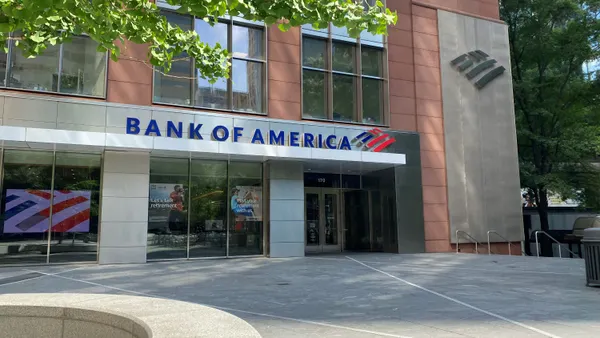Dive Brief:
- Shareholders at Citi, Wells Fargo and Bank of America voted down climate change proposals at their respective annual general meetings Tuesday.
- Citi’s proposal, which would have limited the bank from lending and underwriting new oil and gas projects, garnered 12.8% of the vote. Similar proposals at Wells Fargo and Bank of America each received 11% of shareholder support.
- Similar measures will be up for a vote in the coming weeks at three more of the nation’s top financial institutions: JPMorgan Chase, Goldman Sachs and Morgan Stanley.
Dive Insight:
Shareholder votes are nonbinding but may herald coming change, given enough support. A shareholder proposal last year that would have forced Goldman to publish a report on how mandatory arbitration affects its staff and workplace narrowly failed, with 49% backing, and the bank rejected it. But Goldman reversed course in June, agreeing to review the issue.
Likewise, Citi agreed in October to undergo a racial audit, months after a shareholder proposal on the matter garnered 38% support.
Tuesday's shareholder proposals come as the banking industry has seen a record number of climate-focused petitions aiming to pare lending to the fossil-fuel industry, according to Politico. The boost in climate proposals follows the Securities and Exchange Commission’s decision in December to broaden the types of issues that shareholders are allowed to raise at annual meetings.
The climate change resolutions were submitted by the Sierra Club Foundation at Wells Fargo, Harrington Investments at Citi and Trillium Asset Management at Bank of America.
Harrington and Boston Common Asset Management, in a supporting statement in Citi's proxy filing, said “a change in policy is needed” to “close the gap between [Citi’s] words and actions” regarding climate change.
Citi CEO Jane Fraser told shareholders on Tuesday it’s “not feasible for the global economy or for human health or livelihoods to shut down the fossil-fuel economy overnight.”
“The transition needs to be accelerated, but it also needs to be managed to minimize the shock to our economy and our communities,” she said, according to Bloomberg.
At Bank of America, CEO Brian Moynihan was asked if he would commit to ending the bank's relationships with fossil-fuel companies that won't adopt policies to limit warming to 1.5 degrees Celsius above pre-industrial levels by roughly 2050.
“We will work with our clients to help make that transition take place, but at the end of the day it is their transition,” Moynihan replied, according to American Banker and the Financial Times.
Likewise, Charlie Scharf, Wells Fargo's CEO, said his bank is “focused on helping our customers as they transition to a low-carbon future,” adding that many are “investing significantly in the development of technologies and decarbonization strategies.”
The bank asserted the Sierra Club's proposal was not “reasonable based on current energy usage,” adding that it wanted to ensure “ongoing participation in financing the new capabilities and resources Oil & Gas companies will need for the future.”
“We’ve favored engagement over divestment,” Scharf said, according to American Banker.
However, Loren Blackford, who leads the Sierra Club's investment committee, countered that the nonprofit isn't asking for divestment — just a strategy that aligns with Wells Fargo's pledge to reach net-zero financed emissions by at least 2050.
Citi, Goldman Sachs, Morgan Stanley, JPMorgan Chase and Bank of America, as part of their membership in the Net-Zero Banking Alliance, have made the same commitment.
Fossil-fuel financing from the world’s 60 largest banks reached $4.6 trillion in the six years following the adoption of the 2015 Paris agreement, including $742 billion in 2021 alone, according to a report by the Rainforest Action Network.
JPMorgan Chase, Citi, Wells Fargo and Bank of America accounted for 25% of all fossil-fuel financing identified over the past six years, according to the report.










